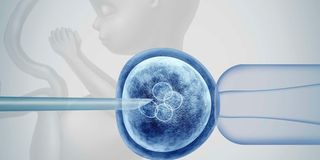The price Kenya pays for delaying surrogacy laws

It has been 16 years since our first local successful in-vitro fertilisation (IVF) babies were born. On May 8, 2006, Dr Joshua Noreh went into history as the first doctor in Kenya to set up a fertility centre, pursuing his passion to bring this special service home and proudly see his effort come to fruition.
The Assisted Reproductive Technologies (ART) field has grown by leaps and bounds in the last two decades. Many fertility specialists are now available in the country, making the service more accessible even though the cost largely remains prohibitive to the vast majority of Kenyans.
Advances in science and health technologies have led to several options for many people, both as couples and as single parents, looking to have babies. People who had all but given up hope of ever being parents are now having a chance at realising their dreams.
Cora* and Derrick* are one such couple. The two met while Cora was recovering from an abusive marriage that had left her scarred and extremely pessimistic about love and relationships. All Cora knew was that Derrick had lost his wife due to pregnancy complications, leaving him devastated and heartbroken.
She was grateful for her daughters. They were the reason she held onto hope amidst the trauma she had undergone in the hands of her ex-husband. Tanya’s* pregnancy and birth was a walk in the park. However, Cora nearly lost her life during Tara’s* birth. She bled so much that the doctor had to remove her uterus to save her life.
She struggled with postpartum depression which was grossly escalated by the lack of support from her then husband and father of her children. By the time Cora walked out of the marriage, she was at her wits’ end. She was tired of the emotional and physical abuse that she was enduring and she wouldn’t allow her children to grow up in such a hostile home. She left to save her life and that of her children.
Derrick fell in love with Cora the first time he met her in the boardroom. He was charmed by her assertiveness and intelligence. He knew he had to get to know this woman better. It took a lot of persuasion to get Cora to go to dinner with him and a lot more persistence for her to consider dating him.
Confession
She lay all her cards on the table from the very beginning. She told him about her inability to bear him children because of her absent womb and her absolute intolerance to relationship abuse. Derrick accepted all her conditions without hesitation. Cora was amazed by the relationship between Derrick and her daughters and began to question his acceptance of never being able to have his own biological child.
She confronted Derrick in her usual forthright way and Derrick confessed that in his previous marriage, they had struggled to bear a child but lost three babies due to severe pregnancy complications. His wife would develop life-threatening early-onset eclampsia, ending in termination of pregnancy before the babies could survive. The third time round, not only did Derrick lose his baby but also his wife. It had been almost a decade of heartbreak.
The conversation brought the couple to my office and we explored the surrogacy option. Both Cora and Derrick could bear a child but they needed a surrogate mother to carry their baby to term. To find a surrogate mother was the easier part. To accept that the law required them to adopt their own baby through the courts was difficult!
The couple and their surrogate mother underwent a successful procedure and a healthy baby boy was delivered on New Year’s Day. He was named Jonathan. The adoption process is still on-going a year and a half later.
The past two Parliaments have been unable to pass the Assisted Reproductive Technologies (ART) bill, whether as a standalone bill or as part of the Reproductive Health Bill. It is inconceivable how this bill can be perceived as controversial. It is a basic human need to want to procreate. The effort that has gone into science to enable those who struggle with conception and child-bearing cannot be underestimated.
What, pray beg, is so difficult to pass a law that recognises surrogacy in all its forms, that ensures that both the person requiring a surrogate mother’s services, the surrogate mother herself and the unborn baby are all protected and safe?
The key issues that require to be addressed include the sanctity of surrogacy as a voluntary act, without coercion or commercialisation; protection of the person seeking the service from exploitation and coercion using the unborn baby; protection of the surrogate mother by ensuring the highest attainable standard of care preconception during pregnancy and in the post-partum period; the protection of the unborn baby from harm; and, finally, amending the registration of births to reflect parentage of the newborn as belonging to the actual mother and not the surrogate mother.
Medical technology is only going to get better with continued research. This research is driven by demand. The population seeking assisted ART and surrogacy is only going to grow. We must stop playing catch up and institute appropriate regulation in a timely fashion.
Over to you, the 13th Parliament, to lead the way!
Dr Bosire is an obstetrician/gynaecologist



